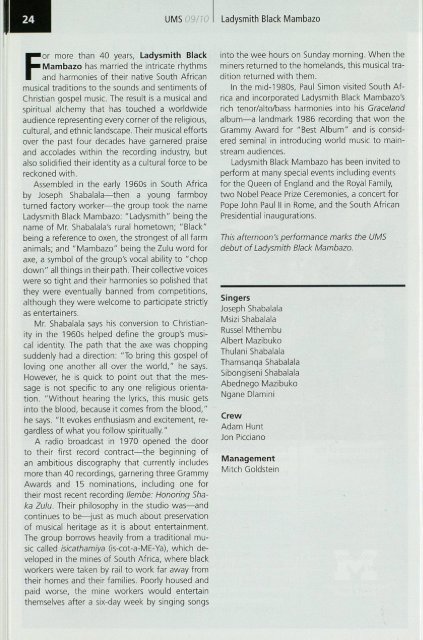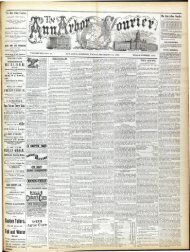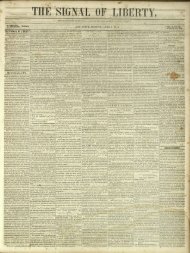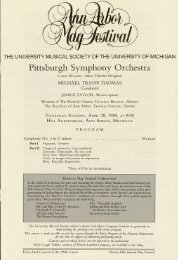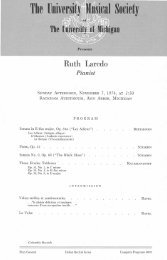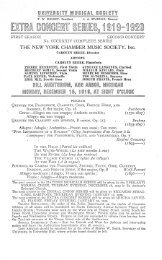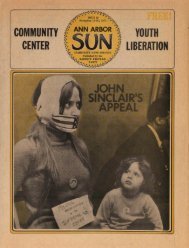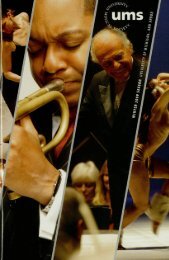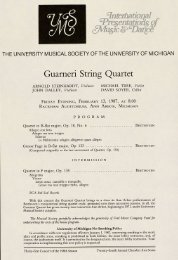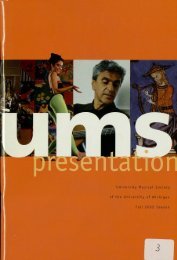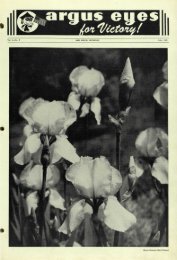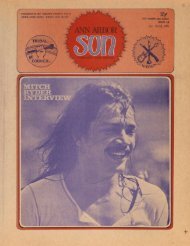Bill T. Jones (Artistic Director/Co-Founder - Ann Arbor District Library
Bill T. Jones (Artistic Director/Co-Founder - Ann Arbor District Library
Bill T. Jones (Artistic Director/Co-Founder - Ann Arbor District Library
Create successful ePaper yourself
Turn your PDF publications into a flip-book with our unique Google optimized e-Paper software.
For more than 40 years, Ladysmith Black<br />
Mambazo has married the intricate rhythms<br />
and harmonies of their native South African<br />
musical traditions to the sounds and sentiments of<br />
Christian gospel music. The result is a musical and<br />
spiritual alchemy that has touched a worldwide<br />
audience representing every corner of the religious,<br />
cultural, and ethnic landscape. Their musical efforts<br />
over the past four decades have garnered praise<br />
and accolades within the recording industry, but<br />
also solidified their identity as a cultural force to be<br />
reckoned with.<br />
Assembled in the early 1960s in South Africa<br />
by Joseph Shabalala then a young farmboy<br />
turned factory worker the group took the name<br />
Ladysmith Black Mambazo: "Ladysmith" being the<br />
name of Mr. Shabalala's rural hometown; "Black"<br />
being a reference to oxen, the strongest of all farm<br />
animals; and "Mambazo" being the Zulu word for<br />
axe, a symbol of the group's vocal ability to "chop<br />
down" all things in their path. Their collective voices<br />
were so tight and their harmonies so polished that<br />
they were eventually banned from competitions,<br />
although they were welcome to participate strictly<br />
as entertainers.<br />
Mr. Shabalala says his conversion to Christian<br />
ity in the 1960s helped define the group's musi<br />
cal identity. The path that the axe was chopping<br />
suddenly had a direction: "To bring this gospel of<br />
loving one another all over the world," he says.<br />
However, he is quick to point out that the mes<br />
sage is not specific to any one religious orienta<br />
tion. "Without hearing the lyrics, this music gets<br />
into the blood, because it comes from the blood,"<br />
he says. "It evokes enthusiasm and excitement, re<br />
gardless of what you follow spiritually."<br />
A radio broadcast in 1970 opened the door<br />
to their first record contract the beginning of<br />
an ambitious discography that currently includes<br />
more than 40 recordings, garnering three Grammy<br />
Awards and 15 nominations, including one for<br />
their most recent recording llembe: Honoring Sha-<br />
ka Zulu. Their philosophy in the studio was and<br />
continues to be just as much about preservation<br />
of musical heritage as it is about entertainment.<br />
The group borrows heavily from a traditional mu<br />
sic called isicathamiya (is-cot-a-ME-Ya), which de<br />
veloped in the mines of South Africa, where black<br />
workers were taken by rail to work far away from<br />
their homes and their families. Poorly housed and<br />
paid worse, the mine workers would entertain<br />
themselves after a six-day week by singing songs<br />
UMS 09/70 Ladysmith Black Mambazo<br />
into the wee hours on Sunday morning. When the<br />
miners returned to the homelands, this musical tra<br />
dition returned with them.<br />
In the mid-1980s, Paul Simon visited South Af<br />
rica and incorporated Ladysmith Black Mambazo's<br />
rich tenor/alto/bass harmonies into his Grace/and<br />
album a landmark 1986 recording that won the<br />
Grammy Award for "Best Album" and is consid<br />
ered seminal in introducing world music to main<br />
stream audiences.<br />
Ladysmith Black Mambazo has been invited to<br />
perform at many special events including events<br />
for the Queen of England and the Royal Family,<br />
two Nobel Peace Prize Ceremonies, a concert for<br />
Pope John Paul II in Rome, and the South African<br />
Presidential inaugurations.<br />
This afternoon's performance marks the UMS<br />
debut of Ladysmith Black Mambazo.<br />
Singers<br />
Joseph Shabalala<br />
Msizi Shabalala<br />
Russel Mthembu<br />
Albert Mazibuko<br />
Thulani Shabalala<br />
Thamsanqa Shabalala<br />
Sibongiseni Shabalala<br />
Abednego Mazibuko<br />
Ngane Dlamini<br />
Crew<br />
Adam Hunt<br />
Jon Picciano<br />
Management<br />
Mitch Goldstein


